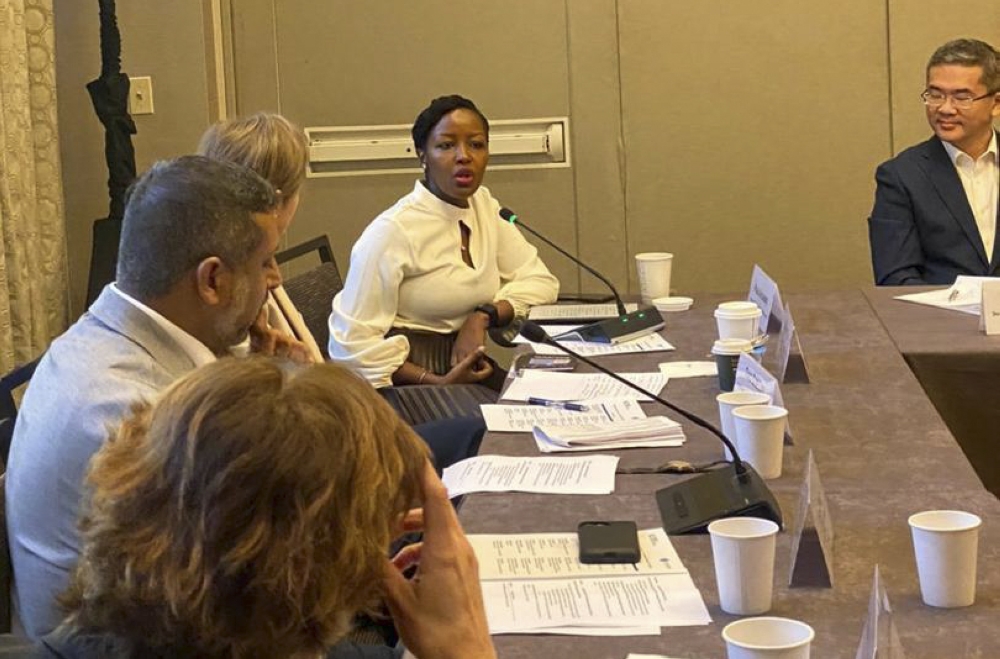

In a move that seeks to help shape the global AI discourse, Rwanda and Singapore introduced the world’s first AI Playbook for Small States, at the United Nations Summit of the Future earlier this week in New York City.
The Playbook, announced by Singapore’s Minister for Digital Development and Information, Josephine Teo, is an anthology of best practices from members of Digital FOSS2 on how they have implemented AI strategies and policies in their countries.
ALSO READ: Rwanda, Singapore launch world's first AI "Playbook” at UN Summit
The Digital Forum of Small States (Digital FOSS) was mooted in 2022 to bring the digital policy leaders from small states together, to exchange views on pressing digital challenges.
AI was naturally an important topic of discussion, with Digital FOSS leaders recognising that there is a growing interest in a "playbook”, or compilation of best practices.
ALSO READ: Inside Rwanda's priority areas as new AI policy takes shape
The Playbook contains input from all the 108 Digital FOSS members representing all geographies, who have come together to share their experiences on how they have pursued AI adoption and development, considered AI governance and safety, and addressed the societal impact of AI.
Here are the five major findings;
Strategies to grow AI adoption, dev’t
Given that AI will alter the nature of many jobs today, workers must be upskilled to be ready for an AI-enabled economy.
According to the Playbook, Small states have limited resources and may need to prioritise their AI efforts for important sectors of their economies.
"To build a vibrant AI ecosystem, it is typically important to have people with the capabilities to develop and deploy AI. Investing in the people living and working in small states can help to ensure the long-term sustainability of the ecosystem,” the Playbook reads in part.
While growing these essential capabilities is multi-faceted, the authors of the findings noted, a suitable starting point may be to grow a competent workforce.
Such a workforce comprises both the technological professionals who are driving AI development and deployment as well as the broader workforce who will need to understand and adapt to AI.
Working with varsities
One method proposed to nurture professionals is to work with local universities and Institutes of Higher Learning to develop specialised AI curricula that are carefully designed to meet the evolving needs of the industry, ensuring that students gain not only theoretical knowledge but also practical skills that are directly applicable to real-world scenarios and use-cases.
Over time, this will create a steady pipeline of technological professionals.
Sharing Rwanda as an example, the Playbook highlights that the country has made efforts to upskill the workforce with 21st-century skills and AI literacy.
It also added that the country has established multiple universities and other higher education learning institutions focusing on teaching and conducting research in information technology and AI.
In 2011, Rwanda partnered with Carnegie Mellon University to establish Carnegie Mellon University Africa, located in Kigali Innovation City, offering master’s level education in AI, ICT and Computer Engineering.
ALSO READ: Kagame launches new CMU-Africa campus, lauds diversity of students
Also through the digital ambassador's program, Rwanda has committed to upskilling over 5 million Rwandan citizens with digital literacy to bridge the digital divide across the country.
"With the strengthening of digital and AI skills as the first priority in the country’s National AI Policy, the government of Rwanda continues to prioritise literacy at the core of its ambition to become a global centre for AI research and innovation.”
Infrastructure
In tandem with investing in human resources, access to infrastructure is equally needed for the effective development and deployment of AI systems.
Compute and data are often seen as two key components to help power development. Countries may have to balance this against the high resource load and environmental impact of these components.
Compute refers to processing power and memory required to run applications on a server
According to industry experts, reliable access to high performance compute is generally recognised as a key building block for AI development.
Compute resources enable the processing of large datasets, training complex models and running intensive algorithms.
As AI continues to scale and evolve, the demand for compute infrastructure is projected to grow.
For Small states, the Playbook maintained that there are different ways to secure compute infrastructure for local use and decisions can be guided by national needs and priorities.
For instance, building dedicated data centres tailored to national needs, such as for national security-related applications, offers the advantage of enhanced control and security.
While for non-sensitive applications, leveraging on cloud service providers presents a flexible and cost-effective alternative.
AI governance and safety
Building a safe and trusted AI ecosystem is multi-faceted. However, according to Playbook, Small states may find a collective sharing of principles and frameworks that can be applied to governance of AI as well as the tools that can assist with this useful.
Small states also recognise that with AI development accelerating, discussion on the different regulatory and governance approaches can be helpful.
Addressing the societal impact of AI
Small states recognise and can strongly identify with the importance of bridging the digital divide arising from AI.
As AI technologies become increasingly integrated into various aspects of society, it is essential for the public to understand the potential benefits and risks associated with AI.
Public literacy on AI can help individuals protect themselves from AI-generated harms.
The Playbook also pointed out that AI’s potential transcends economic value, with the power to uplift individuals, communities, and societies.
It in turn plays an important role in contributing to the achievement of all 17 UN Sustainable Development Goals (SDGs).
The AI Playbook for Small States therefore aims to build a community of small states and other stakeholders to create the space for inclusive discussions on topics such as AI, allowing small states to tap into its transformative potential.
At the launch, industry players hailed the development describing the AI Playbook as an important document that is reflective of Digital FOSS’ collective efforts in harnessing AI for the public good.
In the process, Digital FOSS members can explore how to partner with one another to share resources and build capacity, given the constraints faced by individual small states.


